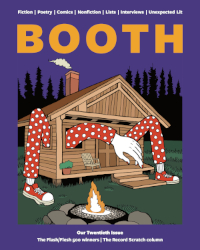helen of troy makes an entrance
i was born from the shell of an egg my mother pushed
from between her thighs, crouched on her hospital bed
like a woman beating slips against a river rock, hollering
for the nurse, for the gyno trapped down the hall
with breech twins, for the state of tennessee to pull off
its work gloves and hold her hand. a mottled blue crowning.
sheets stained and stinking. there was enough time,
before the cracks began, to hold the egg in her arms,
put her cheek to the smooth wall, still warm and wet
from her body. she told me it was as if she held a kind
of anchorage, of holy cell, and to her ears there came
a humming that kept its meter and kept its rhyme,
and my mother, poor woman, knew enough to fear
a daughter birthed to song. herself and her own shelled child,
rocking gently to the box fan’s moan. past the window
were realms of corrugated steel, scrub trees huddled
in roadside ditches, the far-off nuclear plant that might
maybe blow, might maybe save us all. a state of being
she could never recreate: i was outside her body and yet
i was safe, hidden, seen by none but amniotic flowers,
my name a byword for hot closed shield. how to stop a story
from spinning itself to completion? how to arrest a world
in its own natal dark? the quill is scratching. you can hear it,
can’t you: a sound like the tapping of an egg-tooth,
like ice beneath a dancer’s heel. mother, they’re coming,
the ward to your door. they’ll bathe me, dress me,
certify my skin. they’ll wrap me in blankets
of pre-woven thread, cut and tied long before
i breathed the wash of hospital air. let them, mother.
give them my name. let them pass it back and forth
like builders who raise a chamber in lines of stone.
loggerhead excavation, tybee island
all of us around the rim, the biologist on her knees,
one arm sunk into loose sand, her fingers a dragnet
for hatchlings. the nest a crumbled, half-sunk hole,
a house whose crowd has come and gone. shells first,
halved or intact, small punctured sacs deflated
in the hand. give me some air, the biologist said,
but none of us budged: they were emerging at last,
one by one, rowing their soft gray flippers, little children
who’d missed the night’s mass exodus. up they came,
riding a palm to freedom, an archaeology of the living.
we crowded even closer, phones out and recording,
but the biologist was back at work, bringing up the dead.



